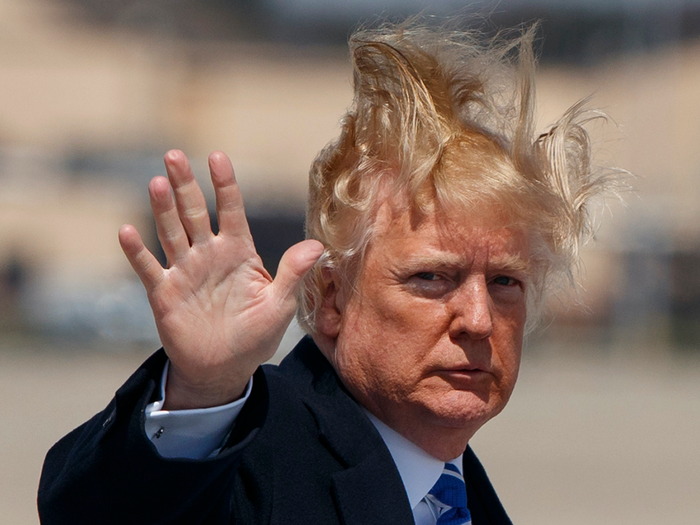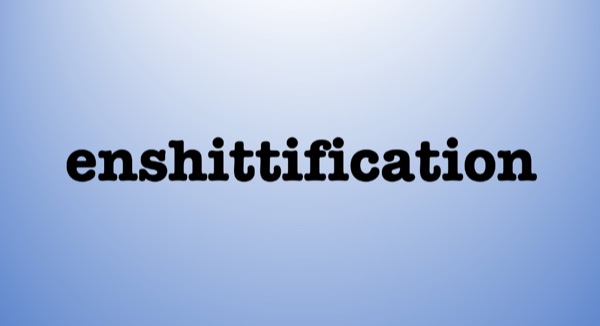Constant defunding of public education, anti-intellectualism, and conservative idealism has made this nation as dumb as a bag of hammers. Being highly educated in America kind of feels like you have a superiority complex but it’s also incredibly frustrating at times.
Can I ask how you cope with the frustration? Touching grass isn’t enough lately.
🍄
For one, the United States lacks a good press corps of independent journalists with broad reach.
Everything is either politicized or commercialized. Shock value sells. Balanced rational discourse does not. Polarization makes too much money for too many people.
On top of that, a systematic destruction of education and a stranglehold of religion practically makes ignorance inevitable.
Maybe we could repair it, but it would take Republicans being blocked from making any decisions for several decades at this point.
Yeah it’s hard trying to save democracy when a large portion of the country has been brainwashed to destroy it all while thinking they’re the most patriotic.
I’m still amazed judges are so clearly divided into groups. I consider being a judge to require a degree of impartiality and authority that anyone clearly identifying as democratic or republican should be disqualified for. Democratic perhaps not since their more centric than left leaning or far left :/. Point being the one occupation that mandates impartiality is highly politicised. Of course everything is f*cked. The rule of law is not dictated by the majority or enforced by the trustworthy.
It’s a catch-22. We can’t fix it, until we fix it.
No no…we had it fixed for centuries, until it was intentionally dismantled over the past 50-70 years (depending on where you wish to place the official start date.) For me, I place it during the 1964 presidential campaign, as that’s the markings of the first ever attack ad.
If you want the public to care about your politics, then politics needs to be about the policies of those politics. Reflection from within. Rather than “but what about the other guy? He’s bad.”
If candidate number one tells you “I will raise taxes, and use the money to pay for schools and roads”. And a second candidate says “I will lower taxes by dismantling social security”. You as a voter then have a choice to make. Pay slightly more in taxes, with better roads, and a better future for the next generation. OR pay less taxes, and probably have your retirement vanish.
Instead, that same scenario today would be “The other guy wants to take your retirement! He’s bad!” and the second candidate says “The other guy is raising taxes. He’s bad!”
So now the general public thinks both candidates are bad, and nobody looks into what the outcome of their other choices have historically been. This then leads them to vote based on sound bytes, rather than historical accuracies.
The end result is nobody cares about politics, because it’s all bullshit anyways.
Username still doesn’t check out.
No no…we had it fixed for centuries
I really don’t understand you there.
No, in fact the very founding of the USA was arguably done primarily so that the ruling class could disregard the respectful boundaries that the English imposed to avoid strife with Native Americans and other colonial powers, which incidentally tended to curb our exploiting the land willy-nilly as we’ve shamelessly done since. It also locked out women and slave voters, preserving a classist system.
Since then there’s been various periods of little / negligible useful social policies, as well as periods in which the ultra-wealthy and common capitalists were UNCHECKED in their ability to thoroughly exploit people and form monopolies, etc etc. Seriously, if the Roosevelts hadn’t come along, those things might have progressed scarily unchecked.
So, no-- I certainly don’t see evidence that our form of democracy was ‘fixed for centuries.’ No, the fact is it’s been a shaky, wild, perilous ride from the day one.
…the 1964 presidential campaign, as that’s the markings of the first ever attack ad.
Maybe in terms of TV, but TV is just a natural extension of media, and media in the States has been used since… at least the early 1800’s? to completely slag-off or outright attack enemy candidates. Indeed, it’s been a perfect blood-bath of disinformation at times, which doesn’t even address all the nasty, vile tricks used to disenfranchise, or outright turn away undesirable voters at the polls. Which yes-- includes outright violence against undesirable voters across centuries in the States.
So, yeah… that all happened.
Altho I DO agree with you that somewhere between 50-70yrs back, the USA has been outright under attack by right-wingers, paving the way for fascism. Basically attacking most of the progress made under FDR and even Republican presidents like Ike.
Trying to survive
Exactly as planned by the reigning political parties.
The media and social media are geared towards reinforcing tribalism. You have to pick a team and anyone on the other team is your enemy. It works well as a means of driving engagement and making money at the expense of having an electorate that is informed.
It reminds me of the town hall Bernie Sanders did on Fox News a few years ago. If you strip away the partisan blinkers and have a debate based on facts, specific policy points, and focusing on trying to improve people’s lives instead of scoring cheap points then more people agree than disagree, regardless of political affiliation.
I guess the question is, “who benefits from a divided electorate?”
Lots of great answers here.
I think one under mentioned cause is the effect of social media algorithms.
All major social media platforms use machine learning algorithms decide what to show in your feed. The algorithms are programmed to show you the things that have historically kept you on the site longer.
It’s human nature to upvote/read/support/engage with the things that agree with our world views, and downvote/dismiss/disengage/discredit the things that disagree with our worldview.
These two facts combined result in you seeing more of the content that aligns with your worldview, and more of the content from people who share your worldview. We’re all funnelled into communities of like minded individuals that repeat what we already believe, reinforcing whatever that is regardless of how factually correct it might be.
Dissenting information that might cause you to reconsider your position or become more politically aware is automatically filtered out.
And it’s not just social media either, even the algorithms behind search engines display this behaviour.
Long before social media existed, Google was tailoring search results to match the things you tend to click on. If you searched for news and typically clicked on the headlines biased towards one side or the other Google would start ranking site with that bias higher.
This wasn’t intentional (at least not originally) it was just a side effect of the algorithm, trying to figure out what you were most likely looking for.
For someone who, for example, believes the Earth is flat. If they were to type “is the Earth flat?” Into a search engine. They are much more likely to get results that “prove” the Earth is flat, then a person who believes the Earth is round, because the algorithm knows that they tend to click on articles that “confirm” the earth is flat.
Algorithms used by social media and search engines today, make it genuinely difficult to maintain a balanced worldview and find unbiased answers to any question. They are all designed to keep you engaged, And it is human nature to engage more with the things we agree with, regardless of truth.
Civics was a single class in highschool.
We need a STEM type push for more civics in highschool and middle school.
Foreign and corporate disinformation campaigns aided by consolidation of TV and print media as well as social media monopolies. Combine that with a lack of time or energy from working long hours, long commutes, and a lack of ability to take time off, much less devote energy to sorting out disinformation that is so common.
Because things were good for a long time and nobody thought we’d lose our rights if we stopped paying attention. Same story throughout history.
As for the people being fed misinformation, they’re just rubes. Our education system failed them and now grifters who don’t care about America are taking advantage of them.
Complacency
And single issue voters, voters unwilling to push their own party (don’t vote or vote for a third party instead of getting involved in the party primaries), siloed media echo chambers, lack of critical thinking, dark money in politics, the proliferation of algorithm driven content feeds, 24 hour news cycle. Complacency is definitely a factor, but not the only one.
“I don’t live in a swing state so my vote does not matter anyways”.
I am not a US citizen, that is just something I picked up from a random interview of a non-voter a while ago. I don’t know if that is a common opinion, but it made sense to me in explaining political disinterest.
It has to do with the electoral college and how it limits voting power. So it contributes to political disinterest.
Do you have stats do back that up, though? Like actual data that says people in other countries are less politically ignorant than americans?
Sure, hang on a second:

Brexit?
Your link just gives information about political awareness in America, there is nowhere anywhere that compares them to any other country like I asked for.
P.s. Trump lost the popular vote.
The question doesn’t compare Americans to other countries. I found some more interesting stats. That seems like a good question to post to /asklemmy.
I definitely specified in my question for a comparison to other countries. You replied to my comment with an irrelevant link. And then now you’ve given me a second irrelevant link. If you can’t answer my question, then stop trying.
Saying “americans are so politically unaware!” Implies Americans alone are unique in being politically unaware. I am looking for actual data that shows specifically americans are less politically aware than the citizens in other countries are about their own countries politics. Showing me information about how bad Americans are at civics tests is not needed here at all.
Do you have stats do back that up, though? Like actual data that says people in other countries are less politically ignorant than americans?
Here’s the statistics you asked for.
Can you explain what you mean by “politically unaware”?
The clear evidence of human ignorance and irrationality in the political arena poses a serious challenge to the popular wisdom. Lacking awareness of basic facts of their political systems, to say nothing of the more sophisticated knowledge that would be needed to reliably resolve controversial political issues, most citizens can do no more than guess when they enter the voting booth. . . . [T]he attempt to influence public policy through such arbitrary guesses is unjust and socially irresponsible.
Dayum.
Interesting article. I would agree that most Americans are politically unaware per that article, because most Americans aren’t economists or historians. It was definitely an interesting read, but what I really noticed is that the article failed to compare American political unawareness to a global baseline, or ateleast provide some comparable country’s numbers, like England, France, Russia, China, Australia, Mexico and Canada?
Makes me wonder if I could pass the US citizenship test…
Edit: 95% on a practice test…
There are practice tests you can take . I bet you can pass it.
Passed that one. It was a little harder than the practice test, but I think it’s about a middle-school level difficulty.
Welcome to America! 🇺🇸
Born here, stuck here.
Anyway, how well do you think American political awareness compares to political awareness of other countries? I honestly haven’t looked yet.
Probably similar to other countries, but the stakes are so much higher because of the $2 billion military budget.
Why did the United States enter the Vietnam War?
Not the easiest kind of question to answer with multiple choice…
Is it money, it’s always money 💰
Are they? Who’s doing that sociology stunt?
It looked like a F##k fest so I decided imma go live in my tiny bubble of happiness.
Not like I need more drama and negativity because some old people who know nothing but to never answer your questions with a straightforward answer, tell me what I need to think or do.
I rather go download some ISOs and mess around on different linux distros.
The average American has been convinced that when they are done being a worker for the day, they become something “better” and more important… the consumer. The consumer has no needs other than consumption. The consumer has no wants other than consumption. Their fellows economically simply become their servants as that is the illusion created by the culture of consumption.
Look at most folks making less than $100k/year and who are voting Republican. Ask them why they are voting and they will give you a myriad of reasons, but (in my experience) it mostly boils down to “they’re hurting the other team and I want to be part of the winning team.” Some liberals will give you the same type of response, but it’s less common (or less enthusiastically so maybe). It’s less that our electorate has been dulled to political activity and more that politics has been turned into a participation sport with teams, branding, and merchandise.
In my experience, the greatest example of this are the folks who’ve been completely demoralized saying “both sides are the same.” It is true that both the Republicans and Democrats are the same… if the only way politics affects you is economically (or if you can convince yourself that that is the case). It’s not the politicians or even the parties that are hurting the average American, it’s the Consumer Capitalism all sides of our politics back that’s hurting us. Now, I’m not going to sit here and tell you a fairytale like “USSR was good actually” or “PRC is good actually.” Just as America and it’s systems have problems, those countries and their systems had/have their own problems.
Being the core of the post-WWII Western hegemony, American politics has problems that are uniquely it’s own; the old adage of “there are no poor Americans, only temporarily embarrassed millionaires” sadly holds true. It affects every level of our politics, culture, and society to the point where no one needs to propagandize to that effect… it’s merely self-reinforces at this point. You work doubles at the Walmart to feed your family and to afford your cell phone plan because you’re just one magic algorithm lift away from TikTok stardom… it’ll happen -any day now- why worry about politics?
Ok so I study political science (second semester so not an expert at all) and last semester I had to research a lot about turnout rates for people in less fortunate situations. The answer is really simple actually. If people live in shit situations they don’t trust the government and they start to not care. Education is worse when you don’t have enough money. There is also a constant struggle to make politics feel closer to the people because that directly impacts if you will educate yourself and go participate. Unfortunately politics feels like politics is either actively against you or at least doesn’t do anything for you if you are at the bottom .One thing that might be important in the US is that slums decrease political awareness / willingness to vote because these people who are probably not going to care are surrounded by more people that don’t care. So if noone around you says something good about the government you are going to hate it even more.
All of this leads to an underrepresentation of these groups which leads to their problems being overlooked or underestimated which leads to worse conditions which leads to less political activity which leads to less representation…its a cycle that makes millions of peoples lives worse every day. And at some point they just don’t care about politics because politics seems to not care about them. None of my sources are in English so get bozoed I could be lying about all of this.
That makes perfect sense. Good luck with the poly sci degree. What I took from this is material conditions effect voter turnout, which in turn effects material conditions.











